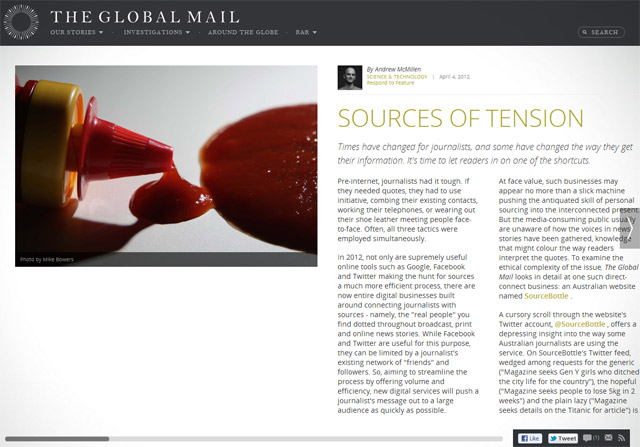The Global Mail story: ‘Sources Of Tension: SourceBottle and online sourcing’, April 2012
A story for The Global Mail, published in April 2012.
Excerpt below; click the image to read the full story on The Global Mail website.
Sources Of Tension
by Andrew McMillenTimes have changed for journalists, and some have changed the way they get their information. It’s time to let readers in on one of the shortcuts.
Pre-internet, journalists had it tough. If they needed quotes, they had to use initiative, combing their existing contacts, working their telephones, or wearing out their shoe leather meeting people face-to-face. Often, all three tactics were employed simultaneously.
In 2012, not only are supremely useful online tools such as Google, Facebook and Twitter making the hunt for sources a much more efficient process, there are now entire digital businesses built around connecting journalists with sources – namely, the “real people” you find dotted throughout broadcast, print and online news stories. While Facebook and Twitter are useful for this purpose, they can be limited by a journalist’s existing network of “friends” and followers. So, aiming to streamline the process by offering volume and efficiency, new digital services will push a journalist’s message out to a large audience as quickly as possible.
At face value, such businesses may appear no more than a slick machine pushing the antiquated skill of personal sourcing into the interconnected present. But the media-consuming public usually are unaware of how the voices in news stories have been gathered, knowledge that might colour the way readers interpret the quotes. To examine the ethical complexity of the issue, The Global Mail looks in detail at one such direct-connect business: an Australian website named SourceBottle .
A cursory scroll through the website’s Twitter account, @SourceBottle , offers a depressing insight into the way some Australian journalists are using the service. On SourceBottle’s Twitter feed, wedged among requests for the generic (“Magazine seeks Gen Y girls who ditched the city life for the country”), the hopeful (“Magazine seeks people to lose 5kg in 2 weeks”) and the plain lazy (“Magazine seeks details on the Titanic for article”) is this jaw-dropper, tweeted on December 10, 2011: “Mag seeks women who have rejected a 6-figure salary, gone blonde, adopted a rescue dog or converted to Islam #beasource.”
It’s a shame that the link leads to a dead-end on the SourceBottle website — the journalist’s deadline has long since expired, and so the “call-out” is shielded from public view — as that story sounds amazing. (Imagine if they found one women who’d done all four disparate tasks?) Mirth aside, it also sounds like an Australian women’s magazine has planned an article and then attempted to find sources to fit their idea of reality, rather than using reporting to inform the outcome. It’s the journalistic equivalent of putting the cart before the horse.
SourceBottle, founded by former PR rep Rebecca Derrington in July 2009, advertises two functions. Firstly, it helps journalists and bloggers find sources for stories. These voices are essential across all forms of journalism: without sources, we’d only ever see, hear and read fiction or opinion. In order to find people to interview for their stories, journalists are allowed to post a “call-out” on the site. If all goes to plan, the journalist can “sit back and sources will find you”, according to the site’s bolded marketing spiel.The concept is instantly appealing to any time-strapped journalist (as most are, after all).
To read the full story, visit The Global Mail.
